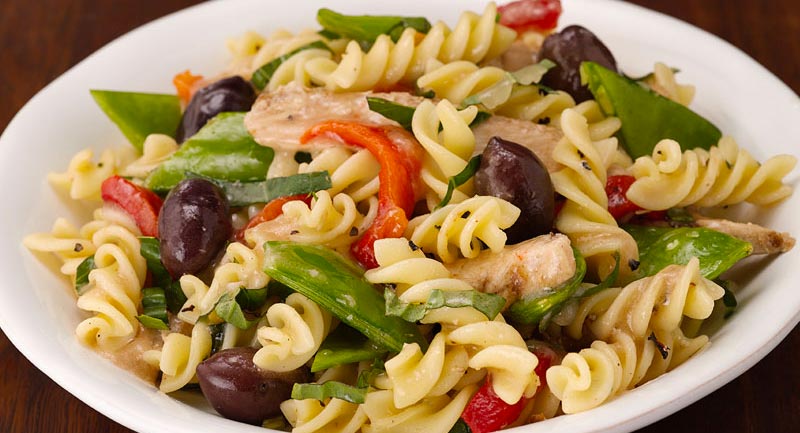Pasta sauce can be considered a great way to sneak more vegetables into your daily diet, helping you eat the recommended 2.5 cups every day. Eating enough vegetables helps lower your risk for cardiovascular disease, high blood circulation pressure, tumor, excess weight and Type 2 diabetes due to fiber, minerals and vitamins they contain.
Macronutrients
The common ready-to-serve marinara pasta sauce contains 65 calories per 1/2-cup serving and you with 2 grams each of protein and fat as well as 10 grams of carbs, including 2.4 grams of fiber. This is about ten percent of the daily value for fiber of 25 grams if you consume a 2,000-calorie diet. Getting plenty of fiber in what you eat helps you fill with fewer calorie consumption and will keep you from getting constipated, as well as cutting your risk for heart disease.
Vitamins
Eating Pasta and Pasta Sauces is also a great way to rise your vitamin intake. Pouring 1/2 cup of marinara sauce together with your whole-wheat pasta offers you a supplementary 5.2 milligrams of niacin, or 26 percent of the DV; 858 international items of vitamin A, or 17 percent of the DV; 3.2 milligrams of vitamin E, or 16 percent of the DV; and 18.3 micrograms of vitamin K, or 23 percent of the DV. Niacin is very important to making human hormones and enhancing your flow, and supplement A supports immune function and vision. Vitamin E serves as an antioxidant and supports immune function, and supplement K helps your blood coagulum and strengthens your bone fragments. Marinara pasta sauce also contains 16,718 micrograms of lycopene, an antioxidant which might lower your tumor risk, and 251 micrograms of lutein and zeaxanthin, which are flower chemicals that help to keep your eye healthy.
Minerals
You get smaller amounts out of all the essential minerals when you eat pasta sauce, as well as larger levels of potassium. Each 1/2-glass portion of pasta sauce provides you with 421 milligrams, or 12 percent of the DV, of the mineral which helps maintain your blood circulation pressure from getting too high and helps to keep your center beating regularly.
Considerations
If you use store-bought pasta sauce it could be high in sodium, with 553 milligrams per serving. That is 24 percent of the suggested daily limit for sodium of 2,300 milligrams for healthy people. You may make your pasta sauce healthier by chopping up extra fruit and vegetables in a number of colors and adding them to your sauce; color suggests which beneficial compounds are in various fruit and vegetables. Try adding red peppers, grated carrots, chopped spinach and mushrooms for a good mixture of nutrients.
Pasta has got a negative rap lately, and it appears, quite unfairly. Just lately published research reveals that pasta ingestion doesn’t donate to over weight, and was actually associated with a lower body mass index. While surveying the eating habits of 23,000 Italians, analysts found that pasta did not correlate to waistline size or BMI among those studied.
That fact is, pasta is a staple ingredient of any Mediterranean style diet. Yep, that’s right. Probably one of the most popular, effective and gimmick free diet programs of this millennium, the Mediterranean Diet, wouldn’t be what it is if it wasn’t for pasta.
THE HEALTH GREAT THINGS ABOUT PASTA
Pasta is the perfect groundwork for a wholesome, nutritious and satisfying meals. Why? To begin with, pasta is the perfect spouse for so a great many other foods, including fibre wealthy fruit and vegetables and beans, center healthy fish, antioxidant abundant tomato sauce and necessary protein packed cheeses, poultry and liver organ. Pasta offers:
SUSTAINED ENERGY:
Sugars like pasta provide blood sugar, the crucial gasoline for the human brain and muscles. And because pasta can be an awesome way to obtain complex carbohydrates (unlike those of the refined and prepared variety – yuk), releasing energy at a slow-moving and suffered level, you don’t find the energy spikes associated with simple sugars.
LOW SODIUM AND CHOLESTEROL FREE:
If you’re watching your cholesterol levels, pasta is simply perfect for you, being very low in sodium and cholesterol free. Per cup, enriched types of pasta give a good resources of several essential nutrition, including iron and B-vitamins.
FOLIC ACID:
Enriched pasta is fortified with folic-acid – essential for women of child-bearing age. A offering of dry pasta supplies the same as roughly 100 micrograms of folic acid, or 25% of the suggested daily intake.
BALANCED DIET:
Pasta is part of an well-balanced diet, with current Australian Government rules suggesting 35% of our daily calories intake should result from complex carbohydrates such as pasta. Combine pasta with slim protein and vegetables for an entire meal that puts you well in relation to hitting those eating goals!
